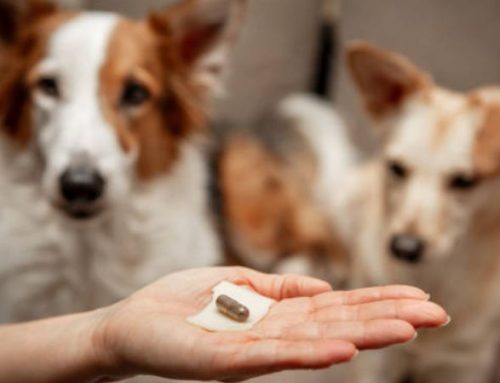If your dog gets anxious during thunderstorms, fireworks, or even car rides, you’re not alone and you’re probably wondering what you can safely give them to help them relax.
Many pet parents turn to over-the-counter calming aids before resorting to prescriptions, hoping for something gentle yet effective. In this guide we’ll explore trusted options that can help ease your dog’s stress, from natural supplements to comforting sprays all designed to bring peace to both you and your four-legged friend.

Natural and Herbal Calming Remedies for Dogs
For pet parents who prefer a holistic approach, natural and herbal calming remedies can be an excellent way to ease a dog’s anxiety without resorting to pharmaceuticals. These plant-based and amino-acid supplements work gently with your dog’s nervous system to reduce stress, improve mood, and support emotional stability. Each ingredient targets specific pathways in the brain to help dogs feel more at ease during stressful moments such as loud noises, travel, separation, or new environments.
Valerian Root
Valerian root has long been recognized as one of nature’s most effective sedatives, offering calming effects for both humans and animals. In dogs, valerian root helps reduce hyperactivity, tension, and restlessness by increasing the amount of gamma-aminobutyric acid (GABA) in the brain—a neurotransmitter that naturally soothes the nervous system. Dogs suffering from noise phobias, separation anxiety, or general nervousness may benefit from valerian-based supplements or treats. Unlike synthetic medications, valerian provides tranquility without dulling your dog’s senses, allowing them to remain relaxed yet alert.
Chamomile
Chamomile is a gentle yet powerful herb known for its ability to ease stress and promote relaxation. Often used in teas for humans, it offers similar benefits for dogs by reducing anxiety, soothing irritability, and even calming upset stomachs caused by stress. Its mild sedative properties make it perfect for dogs who are easily startled or have trouble settling down at night. Chamomile can be found in calming chews, herbal tinctures, and liquid drops designed specifically for pets. Because it’s non-toxic and naturally anti-inflammatory, chamomile provides both emotional and physical comfort, especially for sensitive dogs.
Passionflower
Passionflower is another botanical remedy known for its mood-stabilizing properties. It works by gently slowing down nerve signals in the brain, helping reduce anxious thoughts and behaviors such as pacing, whining, or excessive barking. This makes it particularly effective for dogs that experience fear-related anxiety, like during thunderstorms or vet visits. Passionflower’s unique compounds increase GABA activity, encouraging a sense of calm without sedation. Many holistic veterinarians recommend it as part of a long-term anxiety management plan, especially when combined with other natural ingredients like valerian or chamomile.
L-Theanine
Extracted from green tea leaves, L-theanine is an amino acid that promotes calmness while maintaining mental clarity. Unlike some herbal sedatives, it doesn’t make your dog sleepy or sluggish. Instead, it helps regulate mood-related neurotransmitters such as serotonin and dopamine, promoting relaxation and focus. Dogs that experience situational stress like car rides, grooming appointments, or meeting new people—can greatly benefit from L-theanine-based calming treats or supplements. It’s also safe for daily use and is commonly included in combination products for dogs with ongoing anxiety or hyperactivity.
L-Tryptophan
L-tryptophan, an essential amino acid found in foods like turkey and dairy, plays a key role in producing serotonin the brain chemical responsible for feelings of calm and well-being. When used as a supplement, it can help reduce aggression, tension, and restlessness in dogs prone to anxiety. Many calming dog foods and chews now include L-tryptophan to support balanced moods and stable emotions naturally. Since serotonin also affects sleep quality, dogs taking tryptophan may enjoy more restful naps and less nighttime agitation, making it ideal for both short- and long-term use.
Calming Treats That Combine These Natural Ingredients
Modern pet supplements often combine several of these calming ingredients into one easy-to-administer treat. Popular calming chews may include a blend of valerian root, chamomile, passionflower, and L-theanine to deliver a well-rounded sense of tranquility. These soft chews are flavored with chicken, peanut butter, or beef to make them more appealing to dogs, ensuring compliance even for picky eaters. Some formulations also include probiotics to improve gut health—a factor increasingly linked to emotional balance and stress regulation in pets. The best calming treats are clinically tested, vet-approved, and safe for daily use.
Choosing Safe, Grain-Free, and Preservative-Free Products
When selecting a calming remedy for your dog, always prioritize purity and safety. Look for grain-free, preservative-free, and artificial flavor-free formulas to minimize the risk of allergies or digestive upset. Natural products should list their active ingredients clearly, including the concentration of herbs or amino acids used. Avoid synthetic fillers or artificial dyes, which may counteract the calming benefits. Opting for high-quality, responsibly sourced ingredients ensures that your dog receives a gentle, effective, and consistent form of anxiety support. With the right natural supplement, you can help your dog live a calmer, happier, and more balanced life naturally.
You may be interested: Senior dog anxiety at night
Over-the-Counter Calming Supplements and Products
When your dog shows signs of mild anxiety, there are several over-the-counter (OTC) options that can help bring comfort without the need for prescription medications. These products are designed to gently calm your pet, promote relaxation, and make stressful situations like thunderstorms, travel, or vet visits easier to handle.

Melatonin: A Natural Hormone for Rest and Calm
Melatonin is a naturally occurring hormone that helps regulate sleep and mood in both humans and dogs. For anxious pups, it can help promote relaxation, improve sleep quality, and reduce restlessness, especially in cases of nighttime anxiety or separation stress. Many dog owners find melatonin helpful before stressful events, such as long trips or exposure to loud noises. It’s available as standalone tablets or soft chews formulated specifically for dogs. However, it’s always wise to consult your veterinarian about the correct dosage, as it can vary depending on your dog’s weight and health condition.
Calming Chews and Treats with Melatonin and Herbal Blends
Calming treats are one of the most convenient and palatable ways to help soothe anxious dogs. These chews often combine melatonin with natural herbs and amino acids known for their calming properties such as chamomile, valerian root, passionflower, and L-theanine. Together, they work to support serotonin and dopamine balance in the brain, promoting a relaxed yet alert state without sedation. Look for formulas that are grain-free, preservative-free, and made with natural ingredients to ensure your dog receives only safe, high-quality supplementation.
Pheromone-Based Products: Adaptil Diffusers, Collars, and Sprays
Pheromone therapy is a scientifically backed, non-medicated approach that helps reduce stress by mimicking the natural “calming pheromones” a mother dog releases to comfort her puppies. Products like Adaptil Calm Home Diffusers continuously release these pheromones into the air, helping create a sense of security in your home. For dogs that experience stress outside or during travel, Adaptil collars provide a portable solution that works wherever your pet goes.
In addition, pheromone sprays can be used on your dog’s bedding, crate, or car seat to create a familiar, comforting environment during stressful moments. They’re particularly effective when used before events that typically cause anxiety, such as grooming appointments or fireworks.
Anxiety Wraps and Pressure Vests (e.g., Thundershirt)
Another gentle yet powerful calming aid is the anxiety wrap, often sold under the brand name Thundershirt. These vests apply constant, gentle pressure across a dog’s torso similar to the effect of a comforting hug. This steady pressure activates a relaxation response in the nervous system, helping to reduce fear, shaking, or pacing caused by loud noises or separation.
Anxiety wraps are especially helpful for dogs that dislike thunderstorms, fireworks, or travel. They’re easy to put on, drug-free, and can be used alongside other calming aids like pheromone diffusers or supplements for a combined effect.
Other Over-the-Counter Options
In addition to herbal remedies and pheromone products, several other over-the-counter options can help soothe an anxious or overly excitable dog. Each offers a different approach to calming, but all should be used responsibly and ideally under a veterinarian’s guidance.
CBD Oil or Chews
CBD (cannabidiol) oil and treats have become increasingly popular for their natural calming effects. Derived from hemp and containing no THC (the psychoactive compound in marijuana), CBD helps promote relaxation, reduce stress, and support emotional balance in dogs. Many pet owners report noticeable improvements in their dogs’ behavior during stressful events like travel or loud noises. It’s important to choose products specifically formulated for pets, ensuring they’re third-party tested for purity and safety.
OTC Antihistamines (Benadryl, Dramamine)
Some over-the-counter human medications, such as Benadryl (diphenhydramine) or Dramamine (dimenhydrinate), can occasionally be used to calm dogs — but only after consulting a veterinarian. These drugs may help reduce mild anxiety, motion sickness, or overexcitement by inducing mild sedation. However, incorrect dosages or underlying medical conditions can make them unsafe, so professional guidance is essential before administering any human medication to your dog.
Liquid Calming Supplements
Liquid supplements are another gentle option, often made with a blend of natural calming ingredients like L-theanine, chamomile, or magnesium. They can be easily mixed into food or water, making them ideal for picky eaters or dogs who dislike pills or chews. These formulations help maintain a steady level of relaxation throughout the day without causing drowsiness, offering a convenient way to manage ongoing stress or separation anxiety.
When selecting any over-the-counter calming product, prioritize those made specifically for dogs, free from artificial preservatives, and backed by clear ingredient transparency. Always start with the lowest effective dose and monitor your dog’s response to ensure both safety and effectiveness.

Non-Medication Approaches to Enhance Anxiety Relief
Creating a Safe, Quiet Space
Providing a designated area where your dog feels secure can dramatically reduce stress. This could be a quiet room, a crate with soft bedding, or a corner of your home away from loud noises and heavy foot traffic. Products like ZenCrate offer additional features such as noise insulation, gentle ventilation, and pre-programmed calming music. Ensuring the space has familiar scents, toys, and even a pheromone diffuser like Adaptil Calm Home Diffuser can help your dog feel consistently safe and supported, particularly during stressful situations such as thunderstorms, fireworks, or when left alone.
Using Puzzle Toys for Mental Exercise
Mental stimulation is crucial for alleviating anxiety in dogs. Interactive puzzle toys challenge your dog’s problem-solving skills while providing a productive outlet for nervous energy. These toys can be filled with treats, kibble, or flavored chews to reward focus and persistence. Regular engagement with puzzle toys not only keeps your dog occupied but also reinforces positive behaviors, reducing boredom-induced anxiety and destructive tendencies like chewing or pacing.
Playing Calming Music or White Noise
Auditory stimulation can profoundly influence a dog’s mood. Research indicates that many dogs respond positively to classical music or slow instrumental compositions, such as harp music, which can act as a natural sedative. Alternatively, white noise machines or sound therapy devices, like ThunderCloud, help mask sudden environmental noises such as traffic, vacuum cleaners, or fireworks that often trigger fear and stress responses. Consistent exposure to calming soundscapes can train your dog’s nervous system to remain relaxed during previously anxiety-inducing events.
Massage Therapy and Aromatherapy
Physical touch and sensory therapies can relieve tension in anxious dogs. Massage therapy helps release muscular tension that builds up from stress, improves circulation, and fosters a deeper sense of comfort and bonding between owner and pet. Start with gentle, slow strokes along the neck, shoulders, and back, observing where your dog carries the most stress.
Aromatherapy can further complement massage, but only with pet-safe essential oils properly diluted. Oils such as lavender or chamomile can promote relaxation, while geranium may help reduce agitation. It is critical to ensure oils are not applied directly to the dog’s skin or ingested and that the area is well-ventilated to prevent respiratory irritation. Combining massage with aromatherapy can create a multi-sensory calming experience.
Regular Exercise to Reduce Stress and Excess Energy
Physical activity is one of the most reliable natural anxiety relievers for dogs. Regular walks, play sessions, and structured exercise help burn off excess energy, release stress, and stimulate endorphin production, which naturally promotes feelings of well-being. For dogs with separation anxiety, a long walk or vigorous play session before leaving them alone can reduce hyperactivity and make periods of solitude more manageable. Exercise also provides consistent opportunities for mental engagement and strengthens the bond between dog and owner, which can reduce overall anxiety levels over time.

Safety Considerations
Check Product Ingredients for Quality and Safety
Before using any calming supplement, treat, or product, carefully review the ingredients. Look for high-quality, reputable brands that provide clear labeling and transparency about sourcing. Avoid products with unnecessary fillers, artificial colors, preservatives, or low-quality ingredients that may irritate your dog’s digestive system or cause allergic reactions. For herbal or plant-based remedies, ensure that the dosage and form are appropriate for canine use and that each component is non-toxic to dogs.
Consult a Veterinarian Before Starting OTC Supplements
Even seemingly harmless over-the-counter calming products can interact with other medications or existing health conditions. Always discuss any new supplement, chew, or alternative therapy with your veterinarian, particularly if your dog is taking prescription medications or has chronic health issues such as liver, kidney, or heart disease. Your vet can advise on safe dosages, potential interactions, and whether a particular product is suitable for your dog’s age, breed, and size.
Avoid Essential Oils That Are Toxic to Dogs
While aromatherapy can support relaxation, not all essential oils are safe for pets. Oils such as tea tree, pennyroyal, citrus, cinnamon, and wintergreen are highly toxic and can cause respiratory distress, vomiting, or neurological symptoms. Only use essential oils specifically formulated for pets and always dilute them properly. Never apply undiluted oils directly to the dog’s skin or allow ingestion, and ensure proper ventilation when diffusing scents in your home.
Recognize When Professional Intervention Is Needed
While environmental management, calming supplements, and behavioral strategies can relieve mild to moderate anxiety, severe or persistent anxiety often requires professional evaluation. Dogs exhibiting extreme fear, destructive behaviors, self-harm, aggression, or panic disorders should be assessed by a veterinarian, veterinary behaviorist, or certified trainer. In some cases, prescription medications combined with behavior modification are necessary to achieve meaningful, long-term results. Recognizing the limits of OTC and non-medication approaches ensures your dog receives the appropriate level of care for their condition.






